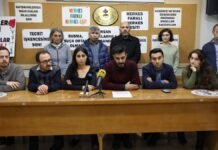Van prosecutors have asked the Council of Forensic Medicine (ATK) to review its assessment of Makbule Özer, an 81-year-old Kurdish woman with serious disabilities and health problems who was previously found fit to serve her prison sentence by the agency, the Evrensel news website reported on Monday.
The prosecutors made the decision based on the discrepancies between the ATK’s recent report finding Özer fit for incarceration and another one in late 2022 that had led to the postponement of the execution of her sentence.
Özer will not be sent to prison until the council comes up with a new assessment, the report said.
Özer is suffering from asthma and shortness of breath. She has limited eyesight and mobility in her knees, ankles and wrists. Her disabilities have been documented in a medical report issued by a local hospital.
Convicted of aiding and abetting a terrorist organization, Özer was arrested in the eastern province of Van in May 2022 and sentenced to two years, one month in prison. In September 2022, the execution of her sentence was postponed for one year at the urging of the ATK.
Since the 1980s, Turkey’s predominantly Kurdish southeastern and eastern regions have been the scene of an armed conflict between the security forces and the Kurdistan Workers’ Party (PKK), a militant group designated as a terrorist organization by Turkey and much of the international community.
In addition to claiming the lives of tens of thousands of people, the conflict has had serious implications for the human rights situation in the affected areas where security forces and the authorities were often criticized for widespread abuses.
The country’s anti-terror legislation is also widely criticized for being overly broad, allowing too much room for interpretation.
In recent years the ATK, the agency consulted for its medical expertise in the cases of sick prisoners, has been accused of complicity in the continued detention of ill prisoners, with its questionable reports that found ailing inmates fit to remain behind bars. Prominent Turkish human rights advocates have accused the institution of having lost all independence from the government.















